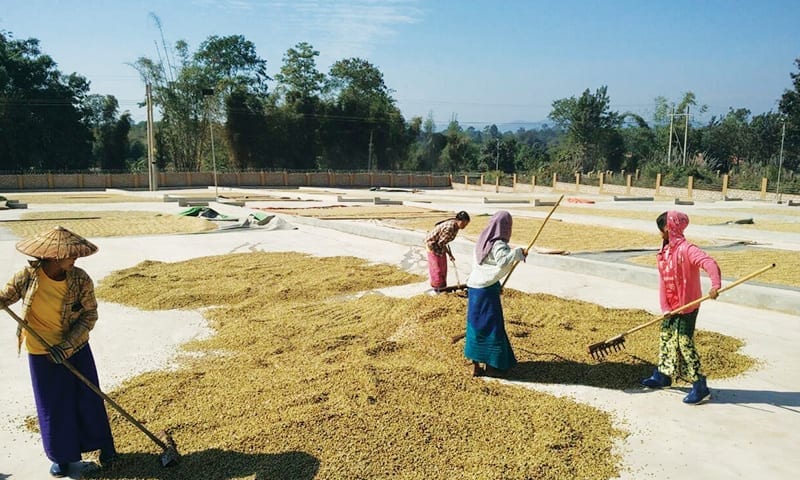
MYANMAR – SUSTAINABLE LIVELIHOODS FOR MINORITY FARMERS
Of all the coffee-producing countries in Southeast Asia, there’s no denying that there’s a palpable buzz about Myanmar (Burma) coffee right now. It’s amazing to think that the first exports – to the US specialty coffee market – only started in 2016.
This is an ancient and genuinely enchanting country with a troubled recent history.
Myanmar’s government and military are subject to continuing international scrutiny regarding the treatment of the Rohingya people in Rakhine state in western Myanmar. We at Indochina Coffee are committed to supporting our partners in Mandalay division and Southern Shan state. We are confident that our direct trade genuinely benefits the farmers we work with – most of whom are from marginalised hill tribes who have switched only recently from opium to coffee as their main cash crop. We believe that specialty coffee can provide sustainable and long-term livelihoods in the region, while the wider benefits of investment in local education and health initiatives will be felt for generations.
We’re very excited about being at the forefront of bringing these excellent coffees to the UK and Europe – constantly developing new relationships with farmers and producers, while building on the close partnerships that we’re lucky enough to already have.
Geography
Myanmar is bordered to its north and northeast by China, to its east by Laos and Thailand, and its west by Bangladesh and India. Myanmar possesses the largest expanse of tropical forest in mainland Southeast Asia with substantial biodiversity, harbouring rare species such as the red panda and the Myanmar snub-nosed monkey. Climate and terroir are perfect for coffee cultivation in various parts of the country, particularly in the Shan hills which stretch into the coffee growing regions of Yunnan and Thailand.
International Aid – A Success Story
If ever there was a good argument for the potential benefits of international aid for the coffee industry, this is it. As part of the Value Chains for Rural Development programme, Winrock International and USAID (in partnership with CQI) began focusing resources on supporting coffee farmers in Myanmar to formalise better quality control practices in 2014. As a result, the quality of the coffee has improved dramatically. With the initial international support much reduced in scale, producers are now in a position to consolidate and build on the learning to really begin to open up demand for their ever-improving coffees.
At Indochina Coffee, our experience of working in NGOs as well as government can sometimes make us naturally suspicious of such international development schemes, where good intentions often sadly fail to translate into meaningful long-term outcomes. However, the easing back of resources and the overall design of the Value Chains for Rural Development programme seem, on the face of it, to be highly effective.
And there’s certainly no denying that the past three years have seen some remarkable improvements in terms of cupping scores for these coffees (nudging as high as 90 in some cases). While some credit should certainly go to the international efforts, the outstanding results are overwhelmingly down to the Burmese men and women involved in the country’s nascent coffee industry more than anything else. We’re always particularly struck by the pride in their achievements and the grit and determination to ensure the specialty coffee industry continues to rate Myanmar as a producing country of note – and not just the latest fad.
It was also fascinating to listen to consultants working with the international aid agencies who had never been to this part of the world before, full of admiration at the difference in terms of attitude: these guys are hardcore, one remarked. They listen, they learn, they get on with it and then they tweak and continue improving their techniques.
Currently, the growing areas producing and exporting the most consistently high quality coffee are mainly in Mandalay division in the north / centre of the country and Southern Shan state further to the south east, bordering Thailand, Yunnan and Laos. This year, we have coffees available from both areas. Chin state in the north west, near the Indian border, also produces some fine coffees.
It’s fairly clear when you spend time here that the terroir, altitude and climate is near perfect in many different parts of Myanmar – what sets the successful coffee growing / exporting areas apart is political stability and decent infrastructure. That’s the harsh reality. Sadly, you would be ill-advised to visit some parts of the country (Kachin state, for example, or even some parts of Northern Shan) on your own without a local guide – indeed, even though it’s been officially ‘open’ since 2011, you’ll still be restricted from visiting some of these parts of Myanmar by officials.
Although there’s still a long way to go, things definitely seem to be changing for the better. We’re passionate about being a part of ensuring the specialty coffee industry has a genuinely vital and integral role to play in shaping a better future for Myanmar.
